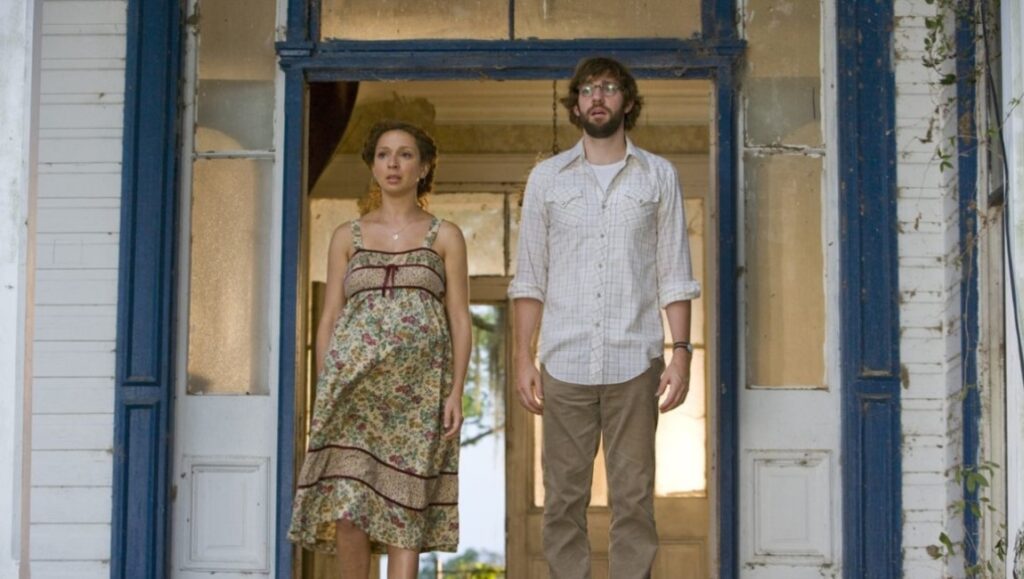To those closely following current cinema trends, it’s relatively common knowledge that when a film is tagged with the word “indie,” this label refers to a specific sub-genre, as opposed to the traditional definition, inclusive of any “independent” film. A modern indie picture usually includes characters that find themselves in some kind of difficult situation (the obstacles required to get to the beauty pageant in Little Miss Sunshine, the pregnancy issue in Juno) and, more often then not, those characters are defined by their specific quirks and eccentricities. These films are frequently marketed with a colorful (often yellow) poster and typeface that strain to look hand drawn with a kind of carefully tuned artlessness. In other words, the “indie comedy” has become a sub-genre as identifiable as any other (action-thriller, romantic-drama, what have you), whereas the traditional independent movie has to have but one thing to qualify as such: production must take place without the oversight of a major studio. Five or ten years ago, the two terms were reasonably interchangeable; with Fox Searchlight becoming something of an Academy Awards powerhouse, and now turning out seemingly more indies than anyone (Little Miss Sunshine, Juno and this year’s uncharacteristic misstep Adam, which opens in July), it’s clear that that’s not really the case anymore.
Initially, Sam Mendes’ Away We Go seems like just another entry in the indie canon; it perfectly fits the criteria outlined above, with its characters embroiled in an emotionally taxing plot and its marketing reliant on familiar poster and trailer animations (very reminiscent of Juno‘s promotional material). And yet, if you look past this stereotypical front, Away We Go emerges as quite the departure from usual Fox Searchlight formulas. It’s being released by reputable distributor Focus Features and, more importantly, script writers Dave Eggers and Vendela Vida draw its central characters intricately and honestly, culling from real-life experiences and nimbly avoiding the irritating quirkiness that films like Smart People and even the highly regarded Juno heaped upon their characters. Away We Go centers on unmarried couple Burt and Verona (John Krasinski and Maya Rudolph), who move into a rundown old house near Burt’s parents (Catherine O’Hara and Jeff Daniels). Verona is six months pregnant with a baby girl when, out of the blue, the parents announce that they’re moving to Belgium. Burt and Verona are shocked and frustrated by this capricious decision; they had moved with the intention that their baby would have grandparents nearby. Feeling a bit aimless, Burt and Verona decide to embark on a carefully planned out road trip, in hopes of finding an ideal milieu in which to raise their baby-on-the-way. The pair first stop in Phoenix to visit Verona’s crass ex-boss (Alison Janney, also in Juno), then Verona’s sister’s (Carmen Ejogo) in Tucson, and on up to Madison, Wisconsin to see Burt’s childhood friend and eccentric college professor LN (Maggie Gyllenhaal, and that’s seriously her character’s name). Finally, the couple arrive in Vancouver, where their college friends Tom and Munch (Chris Messina and Melanie Lynskey) reside.
At each stop, Burt and Verona encounter a variety of different parenting styles and diverse families. But Mendes and his writers don’t force the couple to choose which best suits them; instead, Burt and Verona simply observe the situations they encounter and react accordingly. In the film’s closing stretch, the budding parents settle for an approach that works for them, and not what everyone around them suggests is best. In this way, Away We Go differs from other indies in that it arrives at a conclusion neither predicated on sentimentality or dependent on some huge revelation about life. Away We Go explores complex issues about parenthood and responsibility, particularly in its back half, but it never shies away from its inherent comedy. Krasinski and Rudolph shine in the leads, both drawing from their primarily comedic backgrounds: the former as the snarky, sensitive Jim on The Office and the latter a driving force on Saturday Night Live. With no previous experience in dramatic roles, both actors display a gift that reaches beyond their range as comedic talents, delivering effective and emotional performances that make this couple’s relationship especially believable. Unlike the majority of current films in which couples bicker, shout and cheat (as is the case in a few other Mendes productions), Away We Go takes us to the optimistic side of things, depicting Burt and Verona as two people who are deeply in love and blissfully happy together. In today’s cynical world, a film that offers such confident happiness is unique, refreshing and possibly even inspirational.


Comments are closed.